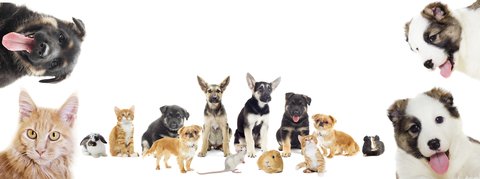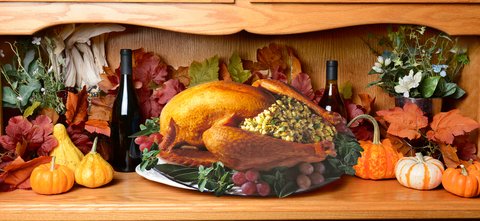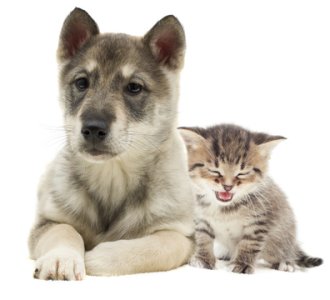This post was originally published on November 15, 2016
The latest update to this post was made 2 years ago.
 Don’t Feed Your Pets These Food Items!
Don’t Feed Your Pets These Food Items!
Pets are part of our family, but some human foods can cause severe issues for your pets. With the holiday season rapidly approaching us – please take a few minutes to familiarize yourself with these common holiday foods (some year-round) that are not recommended for your dogs and cats! Thanksgiving and Christmas holidays always cause a spike in vet visits to due to sick animals.

- Turkey is OK in small, well cooked amounts. Don’t give your pet under-cooked turkey! Hold the turkey skin, it’s very fatty and hard for them to digest. Hold the turkey bones too! Turkey bones pose a choking hazard and they splinter, which can cause damage to the tongue, stomach and intestines.
- Chocolate is toxic to your furry friends, avoid it all together. This includes cakes, chocolate chip cookies, brownies, pies with chocolate as an ingredient. Chocolate, although delicious for humans can cause severe issues for pets… Those issues include: tremors, abnormal heart rate, seizure, vomiting, restlessness and diarrhea.
- Stuffing as delicious as it is is not a good mix for your pet… Why? Well, it depends on the ingredients used to make it! Onions, mushrooms, leeks, chives, scallions and garlic are a no-go for your pet! Even over-the-counter boxed stuffing often include these ingredients. If you happen to make it without any of the listed ingredients, and it’s pretty bland, your pet can enjoy it, in small amounts though. Side effects of ignoring this warning include: vomiting, diarrhea, seizures and in some rarer cases coma or anemia.
- Pies, Candied Foods & Cranberry Sauce are not a good thing to feed your pets, mainly due to the high sugar content. This could include any type of pie imaginable and includes yams, sweet potatoes, and cranberry sauce. Although not a deal breaker, too much can cause hyperness (think little kids on a sugar high), excess body heat (heavy panting, salivating), upset stomach, vomiting and diarrhea.
- Plants (including Lilies, Mistletoe, Poinsettias and Holly) are considered toxic to dogs and cats. Lily is extremely toxic to cats and even in small doses can be deadly. It can cause kidney failures. Holly can cause drooling, upset stomach, vomiting, diarrhea and head shaking. Mistletoe when consumed in larger amounts has been known to cause seizures, ‘drunk’ behavior, vomiting, heavy breathing and in some rarer cases, death. Poinsettia poisoning is the less severe of those listed, but can cause vomiting, drooling, heavy panting, upset stomach, itchiness and diarrhea.
- Nuts, Raisins, Sage, Nutmeg & Cinnamon… Beware! Nuts are very high in fats. Although typically a good thing for humans, not so much for your pets. Did you know Macadamia nuts are toxic to dogs? So are walnuts! Raisins (and grapes) have been linked to kidney failures in dogs and some cats. Sage is high in resins and oils which can upset the stomach, causing possible panting, vomiting, diarrhea and throwing up. Nutmeg (typically used in Pumpkin Pie) has been linked to seizures and tremors in our four legged friends. Cinnamon (in larger amounts) can cause liver disease, low blood sugar and even death.
- Liver is a meat that many dog treats contain and in small doses is OK for most pets. Keep in mind that Vitamin A is extremely high in liver and your pet may not be able to handle that much, especially on a regular basis. Overdose of vitamin A can cause digestive issues and muscle problems.
- Tuna is safe for your pet as long as a few things are kept in mind. You must be sure it’s bone free, the bones can fragment causing bleeding or get stuck in the digestive tract. You should also not feed your pet any canned tuna packed in oil, as the oils can cause upset stomach, vomiting and our old friend diarrhea. Caution should also be exerted because they can contain higher amounts of mercury. Mercury is common in long living fish and the amount can vary depending on where the tuna was caught.
- Breads & Cake Batters (cooked) are typically OK in small amounts, but beware if you make your own! Raw dough, specifically the yeast in the raw dough, promotes conversion of sugars to carbon dioxide and alcohol. They also contain raw eggs, which can carry salmonella. This combination can cause tummy bloat and abnormal (drunk type) behaviors, along with the usual suspects: upset stomach, vomiting, diarrhea and heavy panting.
- Mashed Potatoes prepared standard style (without garlic, scallions, onions, pepper, etc.) are OK to share with your pet in small amounts. As we learned above from ‘stuffing‘ ingredients though, this can be a very bad mix if additional ingredients are added to mashed potatoes and then fed to Fido. The same symptoms as stuffing can occur, including vomiting, diarrhea and in rarer cases seizures.
- Ham Or/Or Pork Products should be avoided or given in small moderation as they are very high in sodium. You should always be sure any pork products shared with your pets is well cooked, as pork often contains parasites, worms and other toxins.
- Alcohol should be a given no no! Alcohol can cause a laundry list of issues for your four legged friends, including: blood acidity, tremors, diarrhea, decreased coordination, vomiting, heavy panting, depression and seizures.
- Apple Cores should not be fed to animals because the seeds contain cyanide. Accidental eating of one is not a big deal, but this all depends on the dogs size, health and how often they ingest the cores.
- Avocados are toxic to horses, but to common house dogs and cats it will only cause upset stomach and possible vomiting. The avocado pit can lodge and cause obstruction in the throat and gastrointestinal tract possibly requiring emergency veterinary care.
- Cheese, Milk & Ice Cream are three things you should keep away from your pet! Dogs especially are typically lactose intolerant in some way shape or form. The lactose intolerance means they cannot digest lactose, a natural sugar found in dairy products. Symptoms of this will include gas, bloating, belly pain, diarrhea and elevated body temperature.
- Potato Peels are not good for your pet! The peels contain oxalates. Oxalates are strong acids that are naturally occurring substances in a wide variety of foods. They play a supportive role in human metabolism, but in dogs and cats, these oxalates can wreak havoc on the digestive system. Symptoms include runny stools, vomiting, fatigue, depression, tremors and in some cases seizures.
- Moldy Foods are not good for humans or animals. This can be considered toxic for dogs and cats. Symptoms include tremors, vomiting, diarrhea and in some cases seizures. Moldy foods should be kept far away from your pets reach!
Quick Fixes:
Important Note: we are not doctors or vets – use the following suggestions at your own risk! Always seek help from a poison control center, your local veterinarian or local animal hospital if you are in doubt. You can reach the national Animal Poison Control Hotline (888) 426-4435 if you have additional questions.
WARNING: Do not induce vomiting if your pet consumed drain opener, petroleum based products (such as gasoline) and acids (such as battery acid). Do not induce vomiting if the animal is having seizures, is unconscious, has a very low heart rate or if the ingested object was sharp or pointed. Call the poison control center for additional information on next steps.
Inducing vomiting for chocolates, flowers eaten, etc. can normally be accomplished by using Hydrogen Peroxide or salts. You should use approximately 1 teaspoon (tsp) per ten pounds (lbs) of body weight. Example: a 50 pound dog would require 5 teaspoons. Alternately, table salt delivered the far back of the throat will induce the same behaviors. Be sure you are outside or in a bathtub, on a tiled floor, etc. This process normally works quickly so be ready!
 In any case, if you have a sick pet or have induced vomiting for what ever reason, you should still contact your local animal hospital or vet as they may have additional steps to perform. For emergencies, contact the Animal Poison Control Center at (888) 426-4435.
In any case, if you have a sick pet or have induced vomiting for what ever reason, you should still contact your local animal hospital or vet as they may have additional steps to perform. For emergencies, contact the Animal Poison Control Center at (888) 426-4435.
Much like humans, pets vary in size, dietary tolerance and ability to process the items listed above. This list is provided only as reference and could save you from costly vet bills over the holiday season! Did we miss something? Be sure and comment below! If you found this article useful – please consider sharing it on your social media page using the icons above or below!
Tags: #thanksgiving #christmas #pets #dogs #cats #food #vet #family #pet #holiday #animal #blogencounters
![]()

Be the first to comment